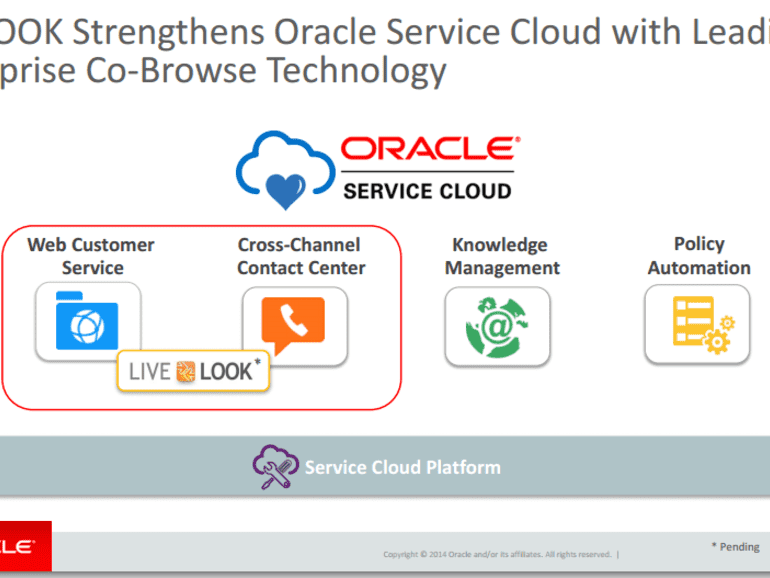![]()
On Friday, the tech giant announced that it has signed an agreement to buy LiveLOOK, a provider of co-browsing and screen-sharing technology. LiveLOOK provides a cloud-based service that enables customer service reps and sales agents to guide customers and prospects through screens on the Web or in mobile environments.
Oracle said that more than 100 of its global customers currently use LiveLOOK as an embedded part of the Oracle Service Cloud. LiveLOOK said it has about 500 customers.
Oracle pointed to LiveLOOK’s ability to offer one-click access for help with such things as filling out forms or navigating online applications. It also said that “visually-enabled personalized engagements help identify and maximize opportunities for increasing average order size, conversions, up-selling and cross-selling rates.” The purchase price was not made public.
‘Exceptional Customer Experiences’
David Vap, Group Vice President of Oracle Product Development, said in a statement that “consumers are increasingly conducting transactions across multiple digital channels such as web and mobile.” He added that LiveLOOK will allow agents to “deliver exceptional customer experiences.”
The move boosts Oracle’s customer experience profile, an increasingly important component of sales, marketing and customer service in an age when a customer can move to a competitor in a second — and when competitors, like Salesforce, are constantly upping the ante.
In April, for instance, Salesforce released a software development kit for its SOS feature so that a third-party developer can embed a button into a mobile app to call up its SOS customer service for a video chat. SOS has been compared to Amazon’s Mayday button on its Kindle Fire HDX tablets, although in this case the company using the service needs to be a subscriber to Salesforce’s customer service.
Workbench, in-Memory
In other Oracle news, the company announced earlier this week the introduction of its Health Sciences Data Management Workbench to help meet the data needs of clinical trials.
The Workbench allows researchers to integrate, reconcile and analyze clinical data in a process that Oracle said is faster and more accurate than other solutions. This is accomplished, in large part, by the automation of data loading, transformation and cleansing processes. As a result, the company said, health sciences organizations can lower the cost and risk of clinical trials while shortening the clinical studies timeline and boosting program productivity.
Earlier this month, the company released a branded in-memory offering for its Database 12c product. It said the new capability helps organizations increase transactional performance and uncover insights in real time.
For compatible Oracle Database versions, the in-memory feature is available as a fully integrated function, and the company described it as “the most industrial-strength offering in the industry.”
Oracle’s In-Memory can be used no matter the size of the database, it supports data tiering, and it does not require special adaption of applications or funneling of data to a separate database. In performance tests, Oracle said its in-memory offering showed speedups ranging from 100 to 1000 times for enterprise application modules.
NewsFactor Network







